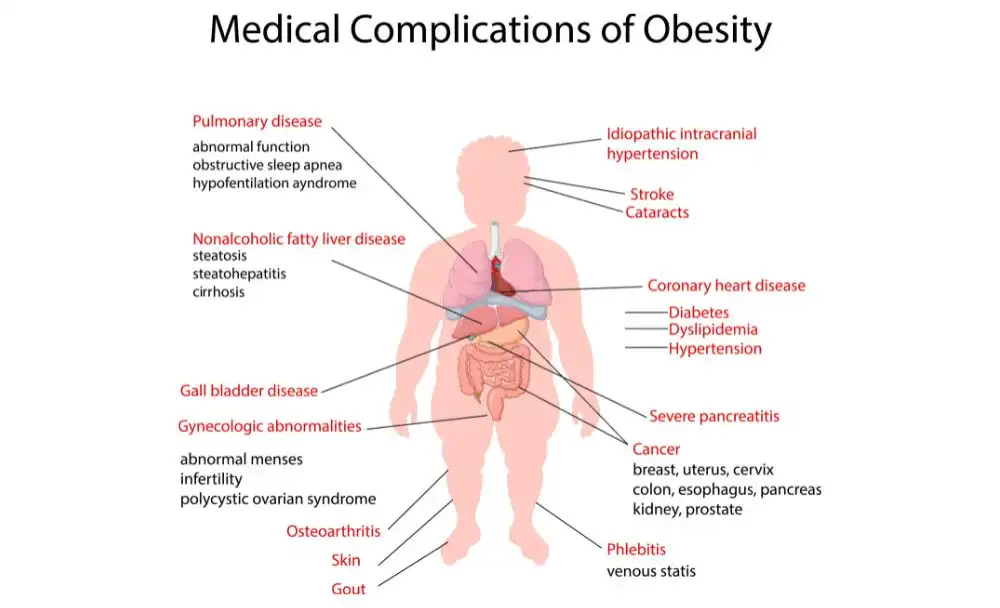Reviewed by Dr. Deepa Kadam

Healthcare experts in India have been sounding alarms over the rising prevalence of obesity in the country, as it is one of the biggest risk factors for most lifestyle diseases, from heart disease and diabetes to liver disease and cancer. Research indicates that over 20% of Indian men and women are obese, highlighting the scope of the threat we face (1). To tackle India’s obesity epidemic, we need to understand obesity’s main causes, including the causes of obesity in children as this increases the risk of chronic diseases in adulthood. While some obesity’s main causes are beyond our control, many of the risks or causes of obesity are modifiable lifestyle factors. This means that simple behavioural and lifestyle changes can protect you from obesity.
What Causes Obesity
Obesity is caused by a complex web of interacting factors, so it would be more appropriate to describe most obesity causes as risk factors, rather than causes. Depending on who you talk to, the 3 main causes of obesity can vary, but they typically include lifestyle choices, genetics and other health conditions.
Modifiable Risk Factors & Obesity Causes
- Excessive food intake and eating disorders: Consuming more calories than you burn through typical daily activities and exercise can lead to weight gain and obesity (2). Eating disorders such as binge eating disorder, bulimia nervosa and night eating syndrome can also cause obesity by disrupting normal eating patterns and causing overeating or compensatory behaviours.
- Sedentary lifestyle: Physical inactivity is another major factor that contributes to obesity (3). People who spend a lot of time sitting, watching TV, playing video games or using computers are more likely to gain weight than those who are more active. Physical activity helps burn calories, maintain muscle mass, regulate hormones and improve mood and mental health.
- Stress: Stress can trigger the release of cortisol, a hormone that helps your body cope with stress. However, chronic or excessive stress can cause cortisol levels to remain high, which can have negative effects on your metabolism, appetite and blood sugar (4). High cortisol levels can increase your cravings for high-fat and high-sugar foods, leading to weight gain. Stress can also interfere with your ability to make healthy choices, such as exercising or eating well. Stress can also affect your mood and mental health, which can influence your eating behaviours and self-esteem.
- Inadequate or poor sleep: As mentioned earlier, insufficient sleep can disrupt the balance of hormone that regulate your hunger and satiety, such as leptin and ghrelin (5). This can make you feel hungrier and eat more than you need. Lack of sleep can also lower your energy levels and motivation to exercise or be physically active. Poor sleep quality can also affect your metabolism and glucose tolerance, which can increase your risk of type 2 diabetes and cardiovascular disease.
Non-Modifiable Risk Factors & Obesity Causes
- Genetic influences: Your genetic makeup plays a significant role in your chances of becoming obese, although it is not the defining risk factor. Nevertheless, some rare genetic diseases make it almost impossible to avoid obesity. For example, Prader-Willi syndrome is a disorder that causes excessive hunger and low metabolism. Genetic variants in several genes may also affect your appetite and energy expenditure (6).
- Physiological influences: Some researchers believe that every person has a predetermined weight that the body resists moving away from. This is called the set-point theory of weight regulation (7). According to this theory, your body has a natural tendency to maintain a certain weight range by adjusting your appetite and metabolism. If you try to lose or gain weight beyond your set point, your body will try to counteract the change by increasing or decreasing your hunger and energy expenditure.
- Your weight history: If you were overweight as a child or adolescent, you are more likely to be obese as an adult. This is because early weight gain can affect your metabolism, hormones and body composition. It can also influence your eating habits, self-esteem and body image. Childhood obesity can also have long-term health consequences such as increased risk of type 2 diabetes, cardiovascular disease and some cancers (8). This is a growing problem in India and the causes of childhood obesity vary greatly. While poor dietary habits and lack of activity are the most common causes of obesity in children, other factors can also play a role such as maternal health during pregnancy.
Health Conditions That Tend to Cause Obesity
- Thyroid disorder: Your thyroid gland is responsible for producing hormones that regulate your metabolism, growth and development. If your thyroid gland produces too little or too much thyroid hormone, it can affect your weight. Hypothyroidism is a condition in which the thyroid gland produces too little thyroid hormone, which can slow down your metabolism and cause weight gain (9). Hyperthyroidism is a condition in which the thyroid gland produces too much thyroid hormone, which can speed up your metabolism and cause weight loss. However, some people with hyperthyroidism may also experience increased appetite and eat more, which can lead to weight gain.
- Polycystic ovary syndrome (PCOS): PCOS is a hormonal disorder that affects women of reproductive age. It causes irregular menstrual cycles, excess hair growth, acne and infertility. PCOS is closely linked to insulin resistance, which means your body does not use insulin properly to control your blood sugar levels (10). Insulin resistance can lead to high blood sugar levels, which can increase your risk of type 2 diabetes and cardiovascular disease. Insulin resistance can also make it harder for you to lose weight or maintain a healthy weight.
- Drugs Related to Modern Medicine: Some drugs can cause obesity or weight gain as a side effect. These include steroid hormones and many drugs used to treat psychiatric conditions such as depression, bipolar disorder, schizophrenia and anxiety (11). Some of these drugs can affect your appetite, metabolism or water retention. They can also interfere with your motivation or ability to exercise or follow a healthy diet.
Obesity-related Medical Complications

Conclusion
While there are some risk factors and obesity causes that are beyond your control, adopting healthy lifestyle choices and habits can significantly lower the risk of obesity, also protecting you from diseases caused by obesity such as heart disease, diabetes, gallbladder disease, liver disease and osteoarthritis, among others. If you have reason to believe that your weight gain or obesity might be caused by non-modifiable risk factors or an underlying health condition, it is important to speak to a qualified doctor to get an appropriate obesity treatment.
FAQs
What is central obesity?
Can obesity cause back pain?
Which are the worst foods for obesity?
Disclaimer: This article is written from a health and lifestyle perspective. It is for general information and not meant to substitute any medical advice. Please consult your doctor for appropriate medical consultation.
References:
- https://www.thelancet.com/journals/lansea/article/PIIS2772-3682(23)00068-9/fulltext
- https://www.ncbi.nlm.nih.gov/pmc/articles/PMC5496172/
- https://www.ncbi.nlm.nih.gov/pmc/articles/PMC3384027/
- https://link.springer.com/article/10.1007/s13679-018-0306-y
- https://www.ncbi.nlm.nih.gov/pmc/articles/PMC6489488/
- https://www.ncbi.nlm.nih.gov/books/NBK573068/
- https://www.ncbi.nlm.nih.gov/books/NBK592402/
- https://www.nature.com/articles/s41598-023-37171-4
- https://www.ncbi.nlm.nih.gov/pmc/articles/PMC4911848/
- https://academic.oup.com/bmb/article/143/1/4/6547855
- https://www.urmc.rochester.edu/encyclopedia/content.aspx?contentid=DM300&contenttypeid=56

























